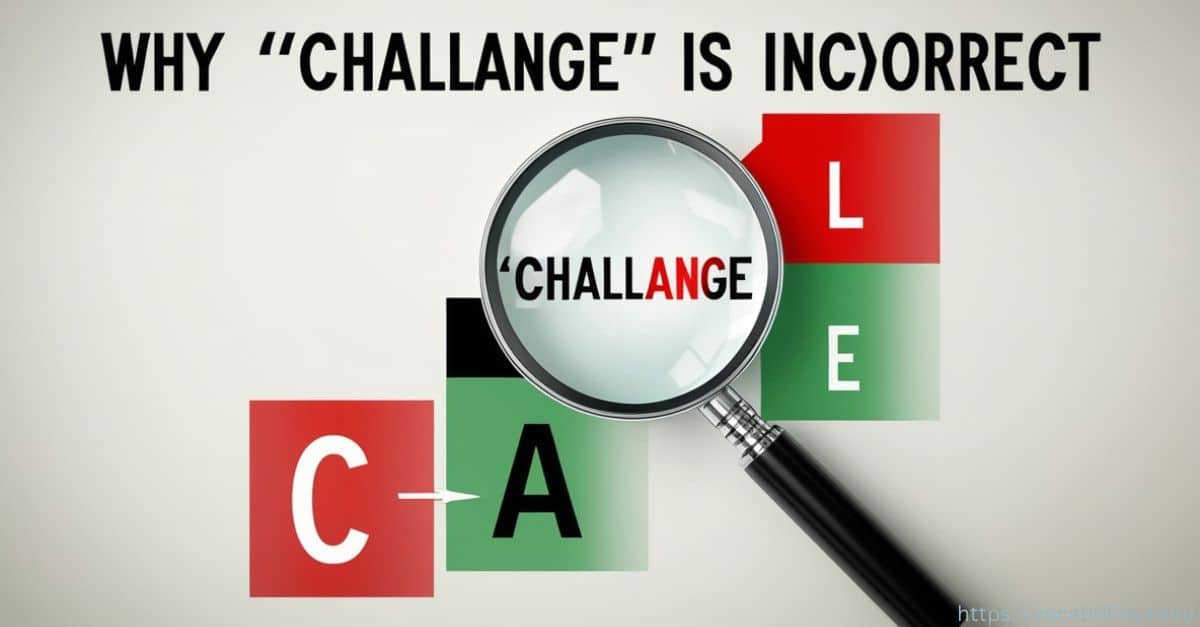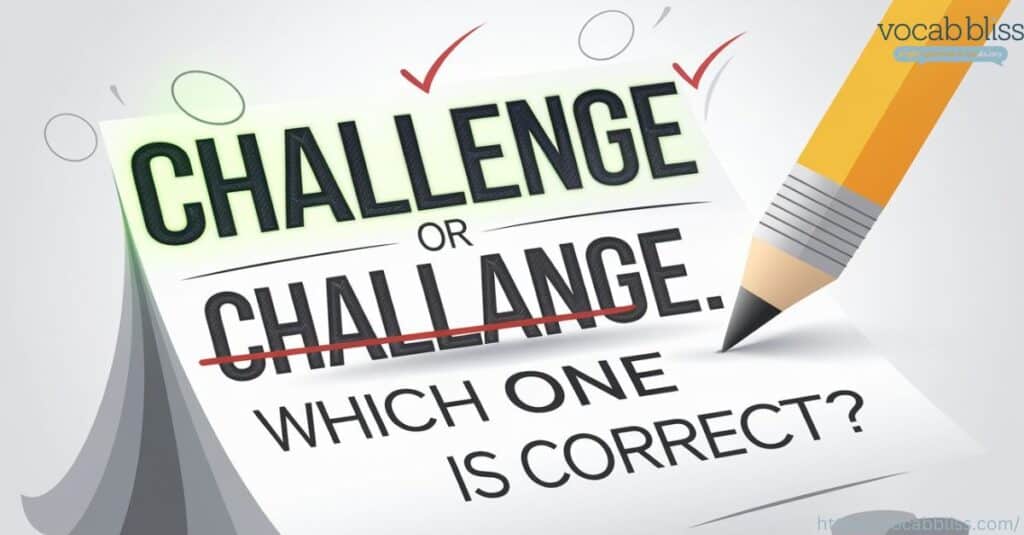When it comes to writing, a single misspelling can undermine the clarity and credibility of your message. One common mistake that people make is confusing “challenge or challange” While the two words may seem similar, only one is correct.
Understanding the difference between these two spellings, knowing when and how to use them, and why spelling matters can improve both your professional writing and everyday communication. This guide will explain the correct spelling, provide examples of usage, and, ultimately, help you avoid this common error.
Introduction

If you’ve ever typed the word “challange” and wondered whether it was right or wrong, you’re not alone. English is full of tricky spelling rules, and, as a result, this is one of the most common spelling mistakes. So, why does this happen in the first place? More importantly, which spelling is actually correct?
In this article, we will explore the right way to spell “challenge,” provide examples of its correct usage, and explain why “challange” is a misspelling. We’ll also dive into related grammar rules, common errors, and offer tips for improving your writing skills.
Understanding “Challange or Challenge”
Let’s start by clearing up the confusion. At first glance, “challenge” and “challange” may appear to be interchangeable. However, only one spelling is acceptable in the English language, and it’s essential to understand why.
The Correct Spelling: “Challenge”
The word “challenge” is a noun and a verb. It refers to a difficult task, problem, or situation that requires effort to overcome. It can also mean an invitation to engage in a contest or competition. In all contexts, challenge is always spelled with one “a” and two “l”s.
Definition of Challenge
As a noun, a challenge refers to something that is difficult to accomplish, or an obstacle to overcome:
- Example: Climbing Mount Everest is a monumental challenge that tests both physical and mental endurance.
As a verb, to challenge means to question, dispute, or provoke someone to face a task or contest:
- Example: She decided to challenge her team’s decision on the project direction.
Usage of Challenge
Here are some common ways “challenge” appears in everyday usage:
- As a noun:
- “He faced a challenge that few would take on.”
- “The committee discussed the financial challenges the organization faced.”
- As a verb:
- “She will challenge his argument in the next meeting.”
- “They decided to challenge the ruling in court.”
Etymology of Challenge
The word “challenge” comes from the Old French word chalenge, which derives from the Latin calumnia, meaning false accusation or dispute. Over time, the meaning evolved to represent both a contest and an obstacle to overcome.
Why “Challange” Is Incorrect

Now, let’s discuss why “challange” is a misspelling and should never be used. It’s easy to see how people may confuse the two forms because they sound the same, but only one is linguistically correct.
Spelling Mistakes: Why “Challange” Happens
The misspelling “challange” likely happens because of the tendency to double letters in words with similar patterns. However, there are specific reasons why “challange” is incorrect.
- “Challenge” follows a consistent spelling pattern in English for words that end in “-ge” (e.g., manage, advantage, message).
- The word “challange” with the extra “a” creates an incorrect form, which doesn’t align with typical English spelling conventions.
- In addition, other words with similar roots (like “change,” “range,” or “strange”) all follow the pattern of a single “a” and “e,” making the “challange” form inconsistent with established English rules.
Fine More: Using or Useing: Common Spelling Mistake Explained
Common Misspellings and Confusions
It’s not just “challange” that’s often misspelled. Here are some other common mistakes related to “challenge”:
- Challanged – This is the incorrect past tense of the verb “challenge.” The correct form is “challenged” (one “l”).
- Challanging – This is the incorrect present participle. The correct form is “challenging” (again, one “l”).
Misspelling Examples:
| Incorrect Spelling | Correct Spelling | Example Sentence |
|---|---|---|
| Challange | Challenge | She will face a great challenge. |
| Challanged | Challenged | He had challenged the decision. |
| Challanging | Challenging | This task is challenging. |
Tips for Remembering the Correct Spelling
- Think of “challenge” as related to words like “change” or “exchange.”
- If you’re unsure, break the word down into syllables: “chal-lenge” – one “a,” two “l”s.
- Practice writing the word in context. Regular use helps reinforce the correct spelling.
Side-by-Side Comparison: Challenge vs. Challange
A side-by-side comparison can help clarify why “challenge” is correct and “challange” is not. Here’s a simple visual breakdown of the two forms:
| Spelling | Correct or Incorrect? | Example |
|---|---|---|
| Challenge | Correct | “The team accepted the challenge of building the project.” |
| Challange | Incorrect | “She faced many challange along the way.” |
As you can see, only “challenge” is used correctly in all contexts. The extra “a” in “challange” simply doesn’t conform to the proper spelling rules of the English language.
Everyday Usage of “Challenge”
In daily conversations and professional writing, “challenge” is used frequently. It appears in various contexts such as business, sports, personal development, and even legal language. Let’s explore how “challenge” is used in different scenarios:
In Work and Career

- Professional communication often involves presenting and overcoming challenges:
- “The team faces a challenge in meeting the project deadline.”
- “It’s important to challenge assumptions during the decision-making process.”
In Sports and Personal Development

- Athletes often challenge themselves to push beyond their limits:
- “Climbing Mount Everest is one of the greatest physical challenges.”
- “She accepted the challenge to train for a marathon.”
Legal and Court Settings

In legal contexts, the word “challenge” has a formal meaning, often referring to disputing or questioning a ruling or decision:
- “The lawyer plans to challenge the court ruling.”
- “They challenged the evidence presented in the case.”
Everyday Conversations
In casual settings, we often use “challenge” to refer to things that require effort or determination:
- “Starting a new job can be a big challenge.”
- “She faced a challenge in adjusting to her new life abroad.”
Conclusion
In conclusion, “challenge” is the correct spelling, while “challange” is a common misspelling. Understanding the difference is essential for clarity and professionalism, especially in written communication. Whether you’re writing an email, preparing a legal document, or simply having a conversation, using the correct spelling ensures that your message is taken seriously.
By recognizing common mistakes, practicing spelling, and remembering the key rule that “challenge” has only one “a” and two “l’s,” you can avoid this error in your writing. Always proofread your work and, when in doubt, use a spell-check tool to help catch these small but important mistakes.
Remember, mastering the correct spelling of “challenge” is just one of many important steps toward improving your writing and boosting your language skills. In addition, by paying attention to details like spelling, grammar, and proper usage, you’ll ensure your communication is clear, professional, and effective. Furthermore, take the challenge of improving your writing, and you’ll see the rewards in both your personal and professional life.






